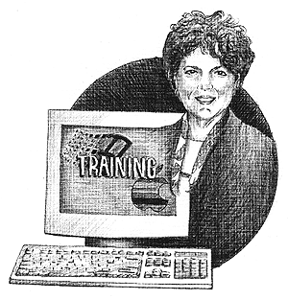



By Ruth Trask
"The WPI Plan gave me the confidence to stand up for what I believe and to not be afraid to take risks," says Virginia Giordano FitzPatrick, president of CALC/Canterbury Corp., a personal computer training company headquartered in Morristown, N.J. "This extended to my disagreeing with my peers and defending my position whenever I believed my ideas were the way to go. Somehow, this tactic worked, especially when I made suggestions that had merit."

Evidently most of FitzPatrick's suggestions had merit. She is now holding the reins of a company that serves more than 3,000 clients from six locations in New York City and northern New Jersey, making it the largest PC trainer in the Manhattan metro area.
How did she become a "guru" of PC training? FitzPatrick attributes much of her success to what she learned through the WPI Plan. She was first drawn to the Plan because of its technical nature and its emphasis on projects. Working on projects forced her to develop the organizational and analytical skills that became the building blocks of her career.
For FitzPatrick, the road to the president's chair has been an around-the-world odyssey. She is married to John FitzPatrick '75, a civil engineer who owns and operates his own business, General Business Services, in Morris Plains. They both worked briefly for Procter & Gamble as young graduates. "John then spent 10 years at Exxon in project management, and his career took us from New Jersey to England to Colombia and back again," she says. "Our daughter Cara, 16, was born in the U.S.: our son, Joey, 15, was born in England; and we adopted our daughter Linda, 10, while we were in Colombia."
Virginia and John enrolled at WPI just after the Plan had been introduced. In those inaugural years, students were allowed to choose whether or not they wanted to study under the university's still experimental undergraduate program. John chose WPI's conventional, pre-Plan curriculum. "He's a traditionalist and I'm more the free-wheeling type," she says. "We were fortunate that WPI offered each of us a curriculum so well tailored to our needs."
In the midst of her world travels, FitzPatrick spent nine years as a systems representative for Control Data Corp. She completed research and development work in computer-aided design that was used by the company worldwide. Back in New Jersey, she joined Computer Applications Learning Center (now CALC/Canterbury) in 1987 as one of the company's first part-time instructors; in less than a decade she would rise to the presidency of the company. Along the way, she has held nearly every position at CALC.
As an instructor and later as director of training, she developed instructional methods that have been adopted as industry standards. "One of my goals was to standardize training materials," she says. "Regardless of the software or the class, I wanted all training manuals to have the same style, layout and structure. Today, all CALC's training manuals adhere to my original courseware specifications."
In 1994, CALC was purchased by Canterbury Corporate Services, which develops a wide range of business-oriented training programs; FitzPatrick was named president of the CALC/Canterbury division. Since then she has concentrated on enhancing the company's service to its clients, which include AT&T, Sandoz and Prudential. For example, CALC has opened PC training centers in the busiest business sections of Manhattan so staff members can have easy access to courses.
FitzPatrick says her goals for CALC include opening additional training centers and expanding into distance learning and other leading-edge training techniques. "Within five years, I'd like to see CALC fully involved in alternative learning methods and offering additional services and training in all areas of business learning."
FitzPatrick says she calls on her WPI education often as she manages the company. "Sometimes it's rough getting points across to my colleagues and employees who do not have engineering backgrounds and project experience," she says. "They don't see things that someone with technical knowledge sees. To help them think things through, I often give members of my staff projects to carry out, not unlike the projects I did at WPI."
FitzPatrick says her WPI education prepared her well for the business world. She says she also benefited from the university's lopsided male-female ratio. Being in a decided minority "wasn't necessarily a bad thing," she says. "When I started my career, I often found myself in a similar minority. I received little respect or appreciation as a career woman, especially outside of the New York-New Jersey area. Male colleagues usually didn't take me seriously until they learned I held a degree from WPI. WPI has a good reputation in the business world. That reputation has helped me throughout my career."
FitzPatrick says her husband's non-Plan education has helped him advance to head his own company. "We've been through two 10-year plans," she says. "For the first 10 years, John's career was primary and I followed him. For the second 10 years, John was the flexible one and I developed my career at CALC. We just celebrated our 20th wedding anniversary -- the next 10 years we plan to share!"